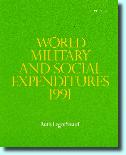Ruth Leger Sivard's |
||
 |
|
Home___Publications___Background___Contact |
|||
| |
||||||
World Military and Social Expenditures by Ruth Sivard |
|
The list of such needs is long and tragic. One out of every eight people worldwide lives on an income of less than $300 per year, in a state of destitution so total that it constitutes silent genocide. Over one billion people, one-quarter of the world’s population, are seriously ill or malnourished. In regions of Southeast Asia, nearly 40 percent of the population is afflicted with malaria, measles, diarrheal and respiratory disease, as well as hunger. In sub-Saharan Africa, where the situation is even more dismal, 10 million children die every year of causes which are easily and inexpensively preventable. One need not travel to the Third World. Large pockets of abysmal poverty and want exist among the mighty superpowers. In the Us about 15 percent of the people lack any health insurance; 315 million have no roof over their heads; 20 million people go hungry several times a month. Yet over the past decade the US has invested almost 3 trillion dollars in the military, or $45,500 for each US family. the military investments of the USSR have been equally enormous, the economic and social situation incomparably grimmer. Both superpowers have behaved like moral pygmies, providing abundance for mighty machines and crumbs for the needs of their own people. Over more than a decade, Ruth Sivard has documented these egregious disparities in military and social expenditures and thereby enabled a generation of peace workers to mobilize world public opinion. The effort is far from over. Increasingly we shall be confronting crises wherein the desperately poor struggle against the wealthy for the right to decent survival and equity. With the spread of nuclear and other weapons of mass destruction, these struggles will be as dangerous in every way as the cold war. The time for action is now. We must move more rapidly to curb the military appetite and promote the public’s welfare. We must also strengthen the institutions that replace war as the age-old method for resolving differences between nations. In the nuclear era this urgent challenge must not be postponed, for delay courts global disaster.
Bernard Lown, MD USA Co-founders of the International Physicians for the Preventon of Nuclear War (IPPNW) |
||

Foreword by Bernard Lown and Eugene Chazov
The unique flow of events in the autumn of 1989 ended a great divide in European confrontational politics. In 1991 the cold war is dead. Even the immoral rationale for the doctrine of deterrence no longer justifies burgeoning arsenals of overkill. Yet the nuclear arms race continues, with programs intact for weapons modernization and proliferation. Bloated military budgets are largely undiverted to long-neglected dire social needs.